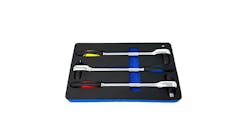Remember: No one has an obligation to pay more in taxes than he or she legally owes.
"Anyone may arrange his affairs so that his taxes shall be as low as possible,” Judge Learned Hand (1872-1961) famously said. “He is not bound to choose that pattern which best pays the treasury. There is not even a patriotic duty to increase one's taxes.” Hand was one of the longest serving and most quoted U.S. Federal Judges.
To get a deeper insight on tax strategiesI talked to a long-time friend and client, Gregory Fydryck, a CPA and tax advisor based in Schiller Park, Illinois.
Here’s the obligatory disclaimer: I am not a tax expert. This article is for informational purposes only. It should not be relied on for tax, legal or accounting advice. Consult your own tax advisor about any tax or financial strategies.
Now with that out of the way, let’s talk taxes.
Check out your paycheck
If you run your business as a corporation (S Corp., C Corp.) and draw a paycheck, you may notice you’re paying less in taxes this year. Now, before you get all warm and fuzzy, you need to be aware you can’t have it both ways.
“That means the tax-time refund you get next year may not be what you expect,” Fydryck says.
Instead of getting it all back in your refund, you may have gotten it all back in your paycheck. So, be prepared.
Year-end buying spree
If you have a few extra dollars in the bank in fourth-quarter, you may be tempted to stock up on inventory at the end of the year. But there is no tax advantage to doing that. You can’t write off inventory that’s sitting on your shelf collecting dust.
But you can write off assets you purchase and put into service before the end of the year.
“So if you need furniture or fixtures, consider buying them before end of year,” Fydryck says.
You can ‘Section 179’ it, which means you can deduct the full purchase price of the products the year you buy them and put them into service.
If you buy shelves, displays, signs, lighting, computers or even software to use on your truck, you can immediately write it off against your current year’s income and potentially lower your tax liability. You can elect to deduct up to $1 million in property that you put into service in 2018. (For details, see https://www.irs.gov/publications/p946).
Keep on trucking – and depreciating
You can’t write-off your entire vehicle under Section 179 unless it cost $5,100 or less, says Fydryck. You can, however, Section 179 the first $5,000 and depreciate the rest of the cost of the vehicle over 5 years. You’d use a “double declining balance” to write off your truck over half a decade.
The math may sound a bit confusing, but your accountant or tax preparer will understand how to do it and will likely have a handy dandy calculator to make number-crunching easier.
Give it the gas
You probably already know this, but you can’t deduct your truck’s miles. You need to deduct actual expenses. So keep accurate records of every gas purchase, repair, insurance payment, license fee and all the other expenses of running your truck.
“Keep two credit cards in your pocket,” Fydryck says. “One that you use for personal items and one that you use exclusively for business.” It will make tax time much, much easier.
See this worksheet online http://philsasso.com/taxtips for an idea of what you may want to consider including on your expense list.
You’ll get a higher standard deduction...
As I said earlier, you’ll get a much higher standard deduction this year.
“It almost doubles from 2017,” Fydryck says.
Amounts increase to $12,000 for individuals, $18,000 for heads of household and $24,000 for married couples filing jointly and surviving spouses.
...Except you’ll get no exemptions
The standard deduction amounts may have doubled, but personal and dependent exemption deductions are eliminated. That means if you are caring for a parent you will not get the $4,150 deduction you may have expected to get this year. Also, be aware that once your child turns 17 you will not be eligible for the child tax credit, either.
That’s crazy.
“No,” Fydyck said. “That’s congress.”
Share your tax tips
Any tool dealer tax tips I may have overlooked? Shoot me an email at [email protected] or leave me a voicemail at 847-250-7445.
I’ll run your tips past a professional and put them online.
If you want credit for your tip, please be sure to give me your name, flag and number of years as a dealer.
Phil Sasso is president of Sasso Marketing, Inc. (sassomarketing.com), a technical marketing agency providing advertising, public relations, and promotional services to tool and equipment makers. Leave a voicemail for him at 847-250-7445.


